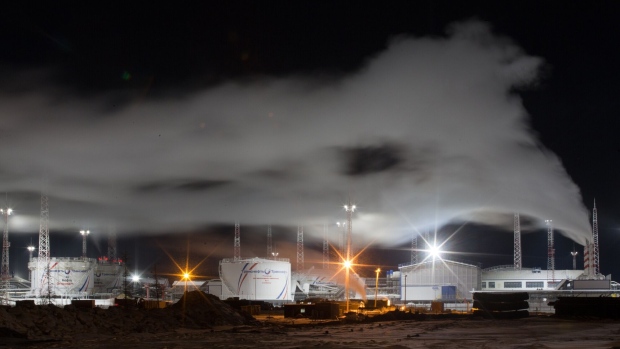Mar 20, 2023
Oil Needs a Helping Hand From Russia
, Bloomberg News

(Bloomberg) -- Welcome to Energy Daily, the Bloomberg newsletter you’ve known as Elements. The name is new, but the mission is the same: to be your guide to the energy and commodities markets powering the economy, tapping the expertise of Bloomberg journalists around the world. Today, we look at Russia’s leverage in the global oil market. To get Energy Daily sent to your inbox, you can sign up here.
Oil prices are retreating again today, with US and Brent futures sinking to the lowest since late 2021 as banking-sector turmoil saps the appetite for risk assets. Russia may hold the key to what happens next.
The country’s oil has continued to flow to global markets despite sanctions. Since the invasion of Ukraine just over a year ago, analysts have predicted production and exports would decline, but after a dip at the start of the war they recovered swiftly.
As Julian Lee reported last week, the International Energy Agency has repeatedly needed to adjust its output estimates higher as Russia has found markets for its crude in Asia.
And the architecture of the oil market has morphed quickly to cope — with new traders and shipowners springing up almost overnight.
The resilience of Russia’s exports (encouraged in Washington to avoid an economically disastrous price spike) is one reason why oil has failed to rally like many predicted at the start of the year. Add in anxiety over the state of the banking system and crude today is below prewar levels.
The slump has even led one of the market’s most ardent bulls, Goldman Sachs Group Inc., to temper its optimism. The Wall Street titan no longer sees oil reaching $100 a barrel this year as recession fears bite.
What happens now? Russia has said it will cut output by 500,000 barrels a day in March. Ostensibly, this is in retaliation for Western sanctions, but it could reflect bottlenecks in the country’s oil system.
Whether Moscow makes good on that pledge — and there are few signals yet that it’s pumping less — will be closely watched by the nation’s allies in the OPEC+ coalition. Ministers in the group are taking a wait-and-see attitude to the price rout as the crisis at Credit Suisse Group AG plays out.
But they’ll want Russia to follow through on its plan. The country’s oil policy supremo, Deputy Prime Minister Alexander Novak, was in Riyadh last week to consult with Saudi Energy Minister Abdulaziz bin Salman. The path of Moscow’s production is likely to have been top of the agenda.
Without a helping hand from Russia, a market turnaround could be a little way off.
--Will Kennedy, Senior Executive Editor for Energy and Commodities
Chart of the Day
The London Metal Exchange has urged warehousing companies to inspect inventories of nickel in its global storage network after discovering that a small number of cargoes of bagged briquettes at one depot in Europe contained stones. The bourse said other forms of metal aren’t susceptible to this type of irregularity, but the incident has sparked concerns that further issues may be uncovered as other cargoes are inspected. More than three-quarters of nickel stored in LME warehouses is in the form of bagged briquettes.
Today’s Top Stories
Oil wasn’t the only commodity to react Monday as UBS Group AG’s emergency purchase of Credit Suisse failed to calm market nerves. Grains fell, industrial metals were mixed and European gas hit the lowest in more than 1 1/2 years.
Global coal consumption will likely peak by next year as economics and climate strategies shift the world toward cleaner energy, but several wild cards could determine how long the dirtiest fossil fuel persists, according to BloombergNEF.
A.P. Moller-Maersk A/S finally found a buyer for its last major energy-division asset after putting it up for sale seven years ago, allowing it to complete a historic transformation into a pure transport operator.
Higher interest rates are forcing commodity traders to rethink some deals and push up prices, in the latest example of how a period of rapid central-bank hiking is reshaping global business.
Europe’s Net Zero Industry Act looks like a straightforward effort to guarantee energy security in line with measures under way in the US and China. Yet the policy will only delay the decarbonization of economies, writes Bloomberg Opinion’s David Fickling.
Best of the Rest
- With aviation one of the hardest sectors to abate in the net-zero transition, Michael Liebreich asks whether electrification or hydrogen represent the best chance to keep the world flying. In his Cleaning Up podcast, he speaks with University of Cambridge Professor of Aerothermal Technology Rob Miller.
- In a podcast for the Oxford Institute for Energy Studies, David Ledesma talks to Mohua Mukherjee about the lessons to be learned from India’s rooftop solar initiative. India is the first developing country to attempt a rooftop program at scale and challenges have emerged almost immediately.
- The New York Times looks at the secret behind Japan’s delicious strawberries. To recreate an artificial spring in the winter months, farmers grow their out-of-season delicacies in huge greenhouses kept warm by giant, gas-guzzling heaters.
--With assistance from Mark Burton.
©2023 Bloomberg L.P.





